Board Building / Tile Laying
[under construction, not very structured...]
Many games allow the player to build a board. Other games such as Monopoly,
where the game board is fixed, in board building / tile laying games, the board
changes every time is played and some cases even while it's played.
Typical examples can be found within Dragons and Dungeons' games such as
Dungeon Quest and Warhammer Quest but also in more recent games such as Tikal
and Conquestador. Although tile-laying is part of the game,
it's not a very prominent part of it, the major part is about decision making
and option evaluation. Games such Aquire really depend on tile
laying, where as it is one of the main components of the mechanics.
In addition there are several dynamic tile boards, where the board
changes during the game (not just by tile-laying). A typical example are the
Labyrinth games. These games are discussed on the end of this page.
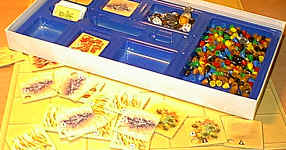 Note: some
games use tiles to change the game at setup, but stay same for the rest of the
game. I do not consider these games as 'real' tile laying games, as the tiles
are just being laying as part of the set up of the game (typical example
'targui'), where you randomly set up the board by laying the tiles. Setlers
of Catan is another typical example.
Note: some
games use tiles to change the game at setup, but stay same for the rest of the
game. I do not consider these games as 'real' tile laying games, as the tiles
are just being laying as part of the set up of the game (typical example
'targui'), where you randomly set up the board by laying the tiles. Setlers
of Catan is another typical example.
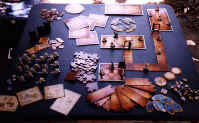 Many (roleplaying) fantasy games such as the Warhammer games (DungeonQuest,
WHQuest, HeroQuest, etc.) use tile tile laying for building up dungeons and
area's to explore. Many economic games however do the same, especially evolution
games like Conquistador, Euprhaat & Tigres. Building the game board is part
of the game. Whereas roleplaying games usually build up dungeons, economic
simulation often build up countries/worlds. The principle is however the same.
Many (roleplaying) fantasy games such as the Warhammer games (DungeonQuest,
WHQuest, HeroQuest, etc.) use tile tile laying for building up dungeons and
area's to explore. Many economic games however do the same, especially evolution
games like Conquistador, Euprhaat & Tigres. Building the game board is part
of the game. Whereas roleplaying games usually build up dungeons, economic
simulation often build up countries/worlds. The principle is however the same.
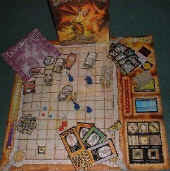
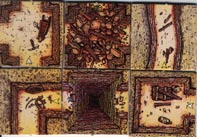
DQ vs Conquistador
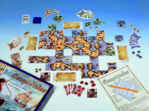
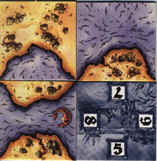
You can actually state that there are two main differences: Tile laying as road
mapping (moving accros the explored tiles) and Tile laying as board build
(and exploiting the explored tiles).
Tile Laying as board building
Typical examples are Tikal and Targui. In these game the board is set with
the help of tiles. The tiles itself are not a major part of the game, they just
vary the options you have.
In some cases the tiles are laid by players (as they have draw a number of
tiles wich they can play (e.g. aquire), in other cases the tiles are laid
randomly (e.g. dungeon quest).
In tile laying by players, in general you can identify two types of
games:
- tile laying is the main mechanism of the game
- tile laying is part of the game (exploration)
In most cases there is no strict line between both. Looking at aquire, tile
laying is crucial, but your strategy to start companies and invest in those
companies and your opponents' companies is nearly as important.
For tikal, settlers or simular games, tile laying is 'merely' opening options. 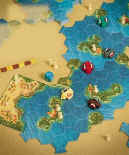 Another
game in this last catagory is 'mississipi queen game' [rio grande games]. In
this game the players operate boats and have a race down the mississipi. The
river is build up by laying pieces of the river. As such the river changes not
just every game, but you never know what tiles / obstacles you will encounter
next turn. However there are many more of these 'discovery' games. A cheap (but
fun game in this catagory is 'the
great brain robbery' where you move forward in a train that build on the
front, but looses cars in the back.
Another
game in this last catagory is 'mississipi queen game' [rio grande games]. In
this game the players operate boats and have a race down the mississipi. The
river is build up by laying pieces of the river. As such the river changes not
just every game, but you never know what tiles / obstacles you will encounter
next turn. However there are many more of these 'discovery' games. A cheap (but
fun game in this catagory is 'the
great brain robbery' where you move forward in a train that build on the
front, but looses cars in the back.
Everchanging boards
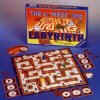 Some boards
evolve or change during the game. A typical example is 'the amazying
labarinth". First you randomly set up the board by tiles, creating some
kind of dungeon. On each turn a player pushes a row or column by with one extra
tile and as such the complete dungeon changes. A player can as move as far as he
wants in the dungeon, assuming the road is not blocked [object of the game is to
collect several items in the dungeon, who first collects them all
wins].
Some boards
evolve or change during the game. A typical example is 'the amazying
labarinth". First you randomly set up the board by tiles, creating some
kind of dungeon. On each turn a player pushes a row or column by with one extra
tile and as such the complete dungeon changes. A player can as move as far as he
wants in the dungeon, assuming the road is not blocked [object of the game is to
collect several items in the dungeon, who first collects them all
wins].
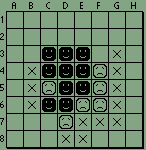 One could
argue that reversi is everchanging board as well. As in you 'capture' enemy
stones, they change to your color. In this catagory there are however many more
examples. How about go? Or abalone? One could argue though that board itself
doesn't change, but that wouldn't be valid, since most of these games have a
'fixed' board. I don't want to start a discussion here, but it's merely a
thought.
One could
argue that reversi is everchanging board as well. As in you 'capture' enemy
stones, they change to your color. In this catagory there are however many more
examples. How about go? Or abalone? One could argue though that board itself
doesn't change, but that wouldn't be valid, since most of these games have a
'fixed' board. I don't want to start a discussion here, but it's merely a
thought.
Here is cool link http://perso.easynet.fr/~philimar/graphpapeng.htm
for a PC programme that enables you to make boards.